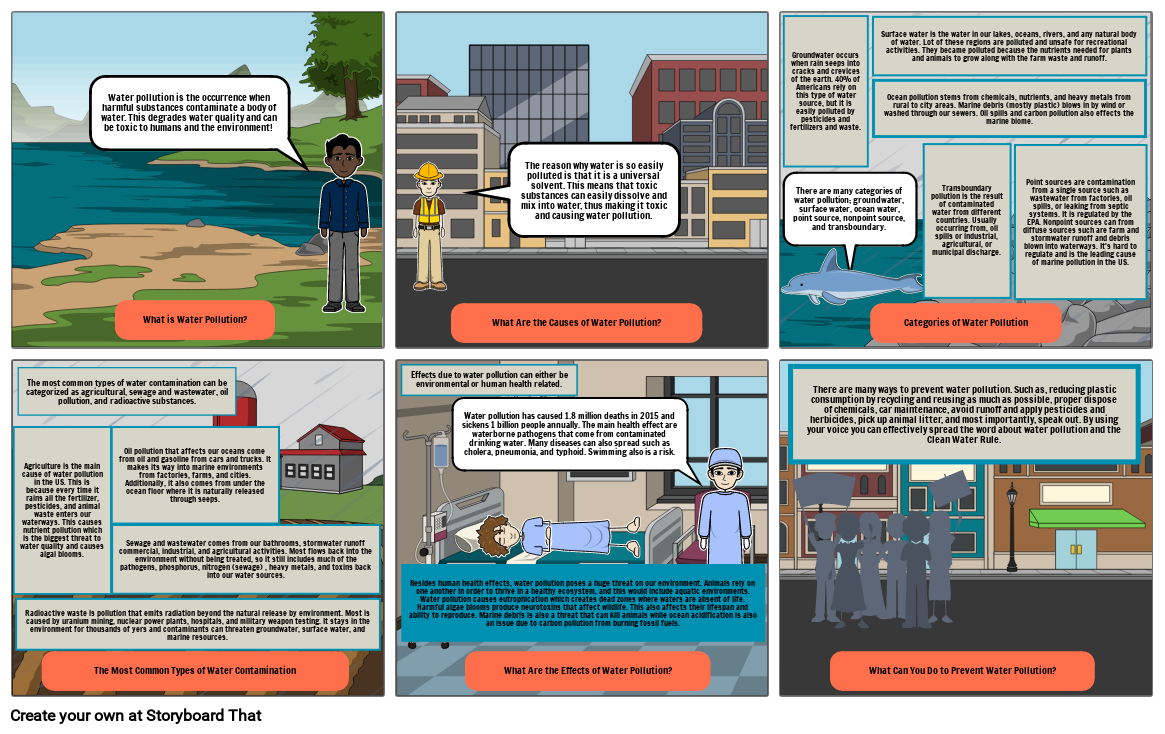
Siužetinės Linijos Tekstas
- Water pollution is the occurrence when harmful substances contaminate a body of water. This degrades water quality and can be toxic to humans and the environment!
- What is Water Pollution?
- What Are the Causes of Water Pollution?
- The reason why water is so easily polluted is that it is a universal solvent. This means that toxic substances can easily dissolve and mix into water, thus making it toxic and causing water pollution.
- There are many categories of water pollution; groundwater, surface water, ocean water, point source, nonpoint source, and transboundary.
- Groundwater occurs when rain seeps into cracks and crevices of the earth. 40% of Americans rely on this type of water source, but it is easily polluted by pesticides and fertilizers and waste.
- Categories of Water Pollution
- Surface water is the water in our lakes, oceans, rivers, and any natural body of water. Lot of these regions are polluted and unsafe for recreational activities. They became polluted because the nutrients needed for plants and animals to grow along with the farm waste and runoff.
- Ocean pollution stems from chemicals, nutrients, and heavy metals from rural to city areas. Marine debris (mostly plastic) blows in by wind or washed through our sewers. Oil spills and carbon pollution also effects the marine biome.
- Transboundary pollution is the result of contaminated water from different countries. Usually occurring from, oil spills or industrial, agricultural, or municipal discharge.
- Point sources are contamination from a single source such as wastewater from factories, oil spills, or leaking from septic systems. It is regulated by the EPA. Nonpoint sources can from diffuse sources such are farm and stormwater runoff and debris blown into waterways. It's hard to regulate and is the leading cause of marine pollution in the US.
- Agriculture is the main cause of water pollution in the US. This is because every time it rains all the fertilizer, pesticides, and animal waste enters our waterways. This causes nutrient pollution which is the biggest threat to water quality and causes algal blooms.
- Radioactive waste is pollution that emits radiation beyond the natural release by environment. Most is caused by uranium mining, nuclear power plants, hospitals, and military weapon testing. It stays in the environment for thousands of yers and contaminants can threaten groundwater, surface water, and marine resources.
- The most common types of water contamination can be categorized as agricultural, sewage and wastewater, oil pollution, and radioactive substances.
- The Most Common Types of Water Contamination
- Oil pollution that affects our oceans come from oil and gasoline from cars and trucks. It makes its way into marine environments from factories, farms, and cities. Additionally, it also comes from under the ocean floor where it is naturally released through seeps.
- Sewage and wastewater comes from our bathrooms, stormwater runoff commercial, industrial, and agricultural activities. Most flows back into the environment without being treated, so it still includes much of the pathogens, phosphorus, nitrogen (sewage) , heavy metals, and toxins back into our water sources.
- Effects due to water pollution can either be environmental or human health related.
- Besides human health effects, water pollution poses a huge threat on our environment. Animals rely on one another in order to thrive in a healthy ecosystem, and this would include aquatic environments. Water pollution causes eutrophication which creates dead zones where waters are absent of life. Harmful algae blooms produce neurotoxins that affect wildlife. This also affects their lifespan and ability to reproduce. Marine debris is also a threat that can kill animals while ocean acidification is also an issue due to carbon pollution from burning fossil fuels.
- Water pollution has caused 1.8 million deaths in 2015 and sickens 1 billion people annually. The main health effect are waterborne pathogens that come from contaminated drinking water. Many diseases can also spread such as cholera, pneumonia, and typhoid. Swimming also is a risk.
- What Are the Effects of Water Pollution?
- There are many ways to prevent water pollution. Such as, reducing plastic consumption by recycling and reusing as much as possible, proper dispose of chemicals, car maintenance, avoid runoff and apply pesticides and herbicides, pick up animal litter, and most importantly, speak out. By using your voice you can effectively spread the word about water pollution and the Clean Water Rule.
- What Can You Do to Prevent Water Pollution?
Sukurta daugiau nei 30 milijonų siužetinių lentelių

